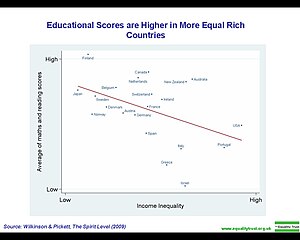Economics of Education
The Economics of Education (also in Economics of Education ) is available as economic discipline since about 1955. Its origin is dated differently, but no later than at the time of the work on human capital by Nobel laureate Gary Becker . Jacob Mincer and Theodore W. Schultz were important pacemakers. Sometimes it is also considered a discipline of educational research . Your main question relates to the profitability of educational spending .
One of the main lines of educational economics examines the impact of education on individual and macroeconomic returns on the labor market . Based on an approach by Jacob Mincer, so-called educational returns are estimated, for example the costs and income of a university education. In the more recent literature, these approaches are expanded to also examine the outcomes of education in other areas (e.g. health, life satisfaction). In the current empirical literature, the focus is on estimating the causal effects of education using suitable statistical ( econometric ) methods.
In addition to estimating educational returns, the “production of education” (which is seen as an important prerequisite for labor market success and other results) is examined in detail. For example, current studies on the economics of education relate to country comparisons of educational institutions and their success in educational production.
In the Federal Republic of Germany, neo-Marxist-oriented political scientists like Elmar Altvater showed an interest in the economy of education in the early 1970s , because the state's deficit expenditure seemed to prove that lower-class children were disadvantaged .
In addition to this orientation of the economics of education, which is mainly assigned to the field of labor economics, another classic field of the education economists is on financially oriented issues, such as the financing of the education system.
A current discussion is the target of ten percent of the German gross domestic product , which Germany should spend on education according to Angela Merkel's Dresden Education Summit 2008. The dispute is about how to calculate what should be included. It depends on whether the previous expenditures can be assessed as already sufficient or as deficit.
Institutions that conduct research in terms of the economics of education
literature
- Elmar Altvater , Freerk Huisken (Ed.): Materials on the political economy of the education sector. Politladen, Erlangen 1971, ISBN 3-920531-08-6 .
- Egon Becker , Bernd Wagner: Economics of Education. Campus, Frankfurt am Main 1977, ISBN 3-593-32188-2 .
- Anke Hanft, Hans Pechar: Education Economy and Education Policy. Waxmann Verlag 2006. ISBN 383096594X .
- Eric Hanushek , Stephen Machin, Ludger Woessmann (eds.): Handbook of the Economics of Education, Volume 3. North Holland, 2010. ISBN 0444534296 .
- Wolf-Dieter Narr : Winter reflections. Nobody dares to speak seriously about education in the context of the university. In: Kalashnikov. The political magazine. 9, No. 3, 1997.
- Erich Ribolits : Education as a commodity? Against the dominance of economic thinking. In: AHAes. No. 7, 2003, pp. 10-12.
- Erich Ribolits: Education as a commodity? About the increasing market form of education and "school autonomy".
- Reinhold Weiß: Economics of Education and Further Education. In: Handbook for adult education / further training. VS Verlag für Sozialwissenschaften 2011. ISBN 978-3-322-99635-0
